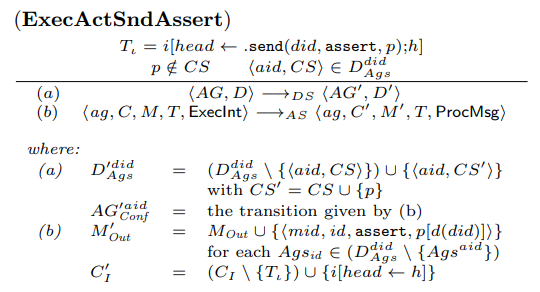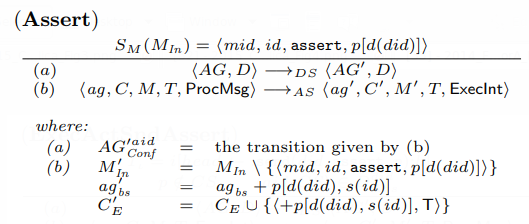2014 FormalSemanticsofSpeechActsforA
- (Panisson et al., 2014) ⇒ Alison R. Panisson, Felipe Meneguzzi, Moser Silva Fagundes, Renata Vieira, and Rafael H. Bordini. (2014). “Formal Semantics of Speech Acts for Argumentative Dialogues”. In: Proceedings of the 2014 International Conference on Autonomous Agents and Multi-Agent Systems. ISBN:978-1-4503-2738-1
Subject Headings: Multi-Agent System.
Notes
Cited By
Quotes
Abstract
In this paper, we give formal semantics to speech acts for argumentative dialogues in the context of an agent-oriented programming language. Our approach to giving formal semantics to such speech acts uses operational semantics and builds upon existing work that provides computationally grounded semantics for agent mental attitudes such as beliefs and goals.
1. Introduction
Communication is one of the key issues in building multi-agent systems, where the agents need to communicate in order to resolve differences of opinion or conflicts of interest, to work coordinately, to resolve dilemmas, and to reach agreements. Many of these communication requirements cannot be fulfilled by the exchange of single messages. They require the exchange of sequences of messages upon related statements. Therefore, agents need the ability to engage in multi-agent dialogues [2,9].
In this paper, we extend the performatives available in implementations of the AgentSpeak agent-oriented programming language, such as Jason [4], to enable argumentative dialogues between agents. We use a selection of performatives that have been widely used in the argumentative dialogue literature, and we give operational semantics to them. The semantics presented here extends the work in [11], where operational semantics was given to basic speech acts only, and only single-message exchanges are considered. Here, because we need to address the social perspective of a dialogue based on argumentation, we have adapted the operational semantics to include two separate transition systems, at the individual and social levels, and how one affects the other.
The main advantage of this new approach to formal semantics of speech acts for argumentative dialogues, compared to previous work such as [7], is that it provides a computationally grounded semantics for the mental attitudes [5] involved in the semantics of the dialogue speech acts. This means that if the performative refers to agent beliefs or intentions, this can be concretely realised and checked in a computational system. Furthermore, because most interpreters for agent languages are implemented according to their operational semantics, our approach provides a more principled way to implement real-world agent systems where agents can argue to reach agreements. Another contribution of our approach is that proofs of properties of dialogue protocols or argumentation systems can make direct use of the inference rules that define the transition relation used to give operational semantics to the performative for argumentative dialogues.
2. RELATED WORK
Work on operational semantics for agent-oriented programming languages can be found in the literature, e.g. [11]. That work provides operational semantic for speech-act based communication, which serves as the basis for our work. In that paper, semantics is given for basic performatives that allow the communication between agents through simple message exchanges. We follow and extend that work with new performatives to allow argumentative dialogues. Furthermore, we need to handle sequences of interactions on related matters rather than single message exchange.
The performatives used in this paper can be found in the literature of argumentative dialogues. Work such as [2, 8, 9] use some combination of these performatives to support argumentation in dialogues, as well as the work in [1] which extends such performative set to support argumentation-based negotiation.
3. FORMAL SEMANTICS
The performatives selected to enable argumentative dialogues in AgentSpeak are: assert, accept, retract, question, challenge. These performatives can be found in [7], where the authors argue that the performatives should to be added to FIPA ACL to enable argumentative dialogues. We refer the reader to [7] for the informal meaning of those performatives.
Other performatives such as open dialogue and close dialogue are used for creating and finishing dialogues, respectively, justify is used to respond to a question or challenge utterance, and two performatives, accept dialogue and refuse dialogue, are used by the participants to accept or refuse taking part in a dialogue, respectively.
3.1 Semantic Rules for New Performatives
In this section, due to the lack of space, we present only the semantics for sending and receiving messages with the assert performative.
Internal Action .send with assert: The action .send with performative assert updates the CS (commitment store) of the agent that performs the action and sends, to all agents in the dialogue, a message stating that the sender is willing to defend this claim.
It should be noted that an assertion is always made to a particular dialogue (identified by did) and not to a specific agent; this is because the agents will introduce new claims that must be defended to all agents participating in the dialogue and not to an individual agent.
Receiving an assert Message: The claim asserted in the dialogue is added to the belief base of the receiver with an annotation of the dialogue identifier d(did) and the identifier of the agent that asserted the claim as the source of that information S(id). The agent that received the message can react to this claim because of the event generated by the belief addition, as usual in AgentSpeak. Whether an agent accepts or not the claim made by another agent depends on its acceptance attitude as described in [8, 9].
4. CONCLUSION
In this paper, we have defined the formal semantics for a set of performatives that enable argumentative dialogues in agent-oriented programming languages. We built our se— mantics on top of the operational semantics of AgentSpeak, and we implemented a dialogue framework in Jason, but the semantics can be used for other agent languages, which is facilitated by the fact that most agent languages are for— malised using operational semantics as well. The semantics formalises the combination of state changes at the individual and social levels and is given for both receiving and sending messages, differently from previous work on speech acts in AgentSpeak that only required forIna1isation of the changes in mental attitudes when messages were received.
As future work, we intend to extend the performatives presented in this paper to new and more expressive ones, such as threats, appeals, and rewards [3, 6, 10], and to prove properties of dialogue protocols using our approach to formal semantics of dialogue speech acts. We also aim to develop applications using the Jason implementation of the semantics presented in this paper.
Acknowledgements
Part of the results presented in this paper were obtained through research on a project tit1ed “Semantic and Multi-Agent Technologies for Group Interaction”, sponsored by Samsung Eletronica da Amazonia Ltda. under the terms of Brazilian federal law No. 8248/91.
References
;
| Author | volume | Date Value | title | type | journal | titleUrl | doi | note | year | |
|---|---|---|---|---|---|---|---|---|---|---|
| 2014 FormalSemanticsofSpeechActsforA | Alison R. Panisson Felipe Meneguzzi Moser Silva Fagundes Renata Vieira Rafael H. Bordini | Formal Semantics of Speech Acts for Argumentative Dialogues | 2014 |

